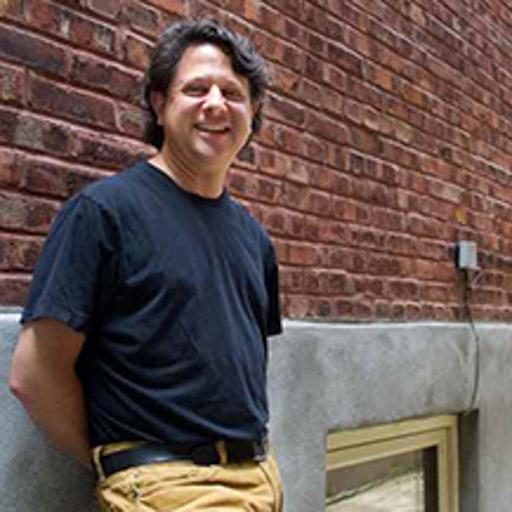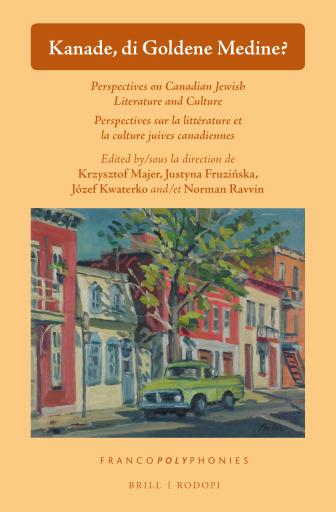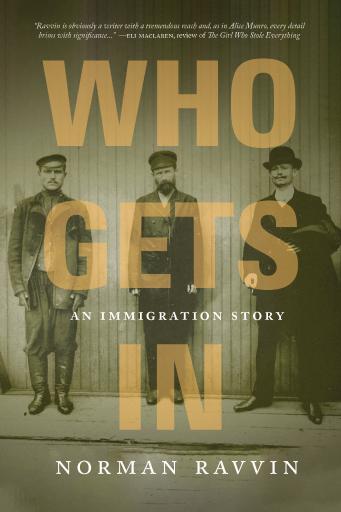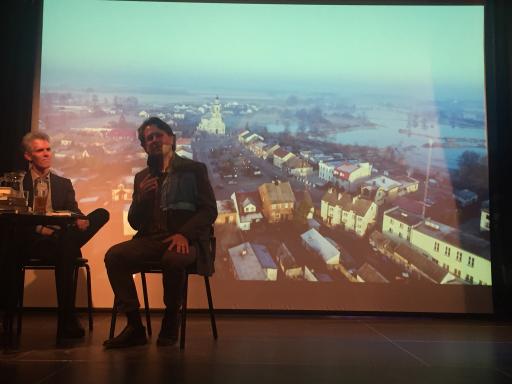
Norman Ravvin, PhD
- Past Chair, Canadian Jewish Studies, Religions and Cultures
Status: Professor
Are you the profile owner?
Sign in to editResearch areas: Canadian Jewish Studies, North American Literature, Holocaust Studies, Eastern Europe, Yiddish literature, Creative Writing
Contact information
Email:
Availability:
ravv@videotron.ca
https://www.instagram.com/concordiacanadianjewishstudies/
Website:
Biography
Norman Ravvin is a critic, fiction writer, and journalist. In 2023 he published Who Gets In: An Immigration Story (University of Regina Press) , which blends memoir, history and archival work to tell the story of his grandfather's efforts to bring his family after him from Poland in the early 1930s. Who Gets In presents prairie life, investigates Canadian Jewish identity in this period, and brings a fresh view of the immigration regime employed at the time by the federal government under R.B. Bennett.
Ravvin's essays on Canadian and American Jewish literature are collected in A House of Words: Jewish Writing, Identity, and Memory (McGill-Queen's). The essays included in this volume focus on such writers as Eli Mandel, Leonard Cohen, Saul Bellow, Philip Roth, Mordecai Richler, and Chava Rosenfarb. A House of Words also considers the role of multiculturalism, postcolonialism, and the Holocaust in the reception of Canadian writing. He is co-editor of The Canadian Jewish Studies Reader (2004), which includes two essays by him, focusing on Eli Mandel and Matt Cohen.
His recent fiction publication is the chapbook The Busker and Willie P. (Espresso Chapbooks, Toronto). His novel of Poland and Vancouver, The Girl Who Stole Everything, appeared in2019 (Linda Leith Publishing). Previous fiction includes The Joyful Child (2011, Gaspereau), Lola by Night, which appeared in Serbian translation, and the story collection Sex, Skyscrapers, and Standard Yiddish. A story from it is in the The New Spice Box: Contemporary Jewish Writing (2020).
Other books include Hidden Canada: An Intimate Travelogue (2001) and the novel, Cafe des Westens, which appeared in 1991 and won the Alberta Culture and Multiculturalism New Fiction Prize. He is the editor of Not Quite Mainstream: Canadian Jewish Short Stories (2001) and Great Stories of the Sea (1999). His published essays focus on Irving Layton, Leonard Cohen, Philip Roth, Bruno Schulz and A.M. Klein. The latter work is in his co-edited volume Failure's Opposite: Listening to A.M. Klein (McGill-Queen's UP, 2011). He contributed an introduction to George Walker's wordless biography of Leonard Cohen, which appeared in trade paperback and artist's special editions. Earlier work includes an essay on "memory tourism" in Poland in Canadian Literature, a chapter on Jewish identity in a collection called Religion and Ethnicity in Canada, and an introduction to the reissue of Gwethalyn Graham's Earth and High Heaven from Cormorant Books.
As general editor of a series in association with Red Deer Press at the University of Calgary and the Institute for Canadian Jewish Studies, he oversaw the publication of books dedicated to Canadian Jewish writing and history. Among the publications from the Institute is Mordecai & Me: An Appreciation of a Kind, by Joel Yanofsky. The Institute brought out, in collaboration with Red Deer Press, Henry Kreisel's 1948 novel, The Rich Man. While chair of Concordia's Institute for Canadian Jewish Studies Ravvin oversaw two chapbook series focused on Canadian Jewish literature and history. The titles in these series include a long short story by Toronto writer Cary Fagan, and a translation of a document dealing with early Montreal Jewish history, by Ira Robinson.
Educaton
PhD University of Toronto, Dept. of English
MA and Honours Undergrad, U.B.C. Dept. of English
Traditions
Judaism
Research interests
Canadian Jewish Studies
Holocaust Studies
Religion and Literature
Ethics
Contemporary Canadian and American Literature
Memoir and Creative Writing
Jewish Eastern Europe, esp. Poland
Field areas
Religion and Literature
Creative Writing and Autobiography
Contemporary Religions and Popular Culture
Theory, Ethics, and Philosophy

Kanade, di Goldene Medine? Perspectives on Canadian Jewish Literature and Culture, co-edited with K. Majer, J. Fruzinska and J Kwaterko (Brill 2018)

Cordova Street, Vancouver

Who Gets In: An Immigration Story 2023 U of Regina Press

Dom Literatury, Lodz Poland
Aritha van Herk
Selected publications
Who Gets In: An Immigration Story, 2023. University of Regina Press.
The Busker and Willie P. Espresso Chapbooks, Toronto 2023.
A novel, The Girl Who Stole Everything, set in Poland and Vancouver, 2019, Linda Leith Publishing, Montreal.
Selected Critical and Fiction publications:
"Pictures of New Canadians: An Immigration Story for Our Time," in No Better Home? Jews, Canada, and the Sense of Belonging. Ed. David S. Koffman, 2021.
"Glendale, North of Alhambra, East of Burbank," in The New Spice Box: Contemporary Jewish Writing, 2020, ed. Ruth Panofksy. U of TP.
"Leonard Cohen: Image, Words, Music," in George A. Walker's Leonard Cohen: A Woodcut Biography. Firefly, 2020.
Kanada, di Goldene Medine? Perspectives on Canadian Jewish Literature and Culture. (Brill 2018) Co-edited with K. Majer, J. Fruzinska and J. Kwaterko. Essays in English and French.
"On Refusing Canada, CanLit and More: National and Literary Identity in All its Varieties," in Studia Anglica Posnaniensia, 2020. Special Vol. Ed. D. Drewniak.
"Placed Upon the Landscape, Casting Shadows: Jewish Canadian Monuments and Other Forms of Memory," in Canadian Jewish Studies, 2021.
"Pictures of New Canadians: An Immigration Story for Our Time," in No Better Home? Jews, Canada, and the Sense of Belonging. Ed. D. Koffman. U of TP, 2020.
"You Say You've OD'd on Leonard Cohen: Canadian Jewish Writing and the Mainstream," in The Oxford Handbook of Canadian Literature, ed. Cynthia Sugars. 2016.
"Words, Music, Image." Introduction to The Wordless Leonard Cohen Songbook by George Walker. 2014.
"Myths of Montreal: Irving Layton, Jewish Thematics and the Mainstream." Canadian Poetry. No. 73 Fall/Winter 2013. Proceedings of the Irving Layton Symposium, University of Ottawa, 2013.
The Joyful Child. Gaspereau Press, 2011.
"The War and Before: Responses in Mainstream Canadian Literary Life" in Nazi Germany, Canadian Responses, Confronting Antisemitism in the Shadow of War. McGill-Queen's, 2012.
Failure's Opposite: Listening to A.M. Klein. McGill-Queen's University Press, 2011.
Canadian Literature, a special issue on Mordecai Richler (co-edited with Nathalie Cooke). UBC (Winter, 2010).
Selected Hungry I Chapbooks/Inst. for Canadian Jewish Studies
Translation of Franz Kafka's Josephine the Singer or The Nation of the Mice by Karin Doerr and Gary Evans. Introduction by Karin Doerr (2021)
Hungry I Chapbooks' Shuln and Shulelach: Large and Small Synagogues in Montreal and Europe, by Sara Ferdman Tauben, 2008.
Hungry I Chapbooks' Opening The Star: Three Responses to the New Translation of Franz Rosenzweig's The Star of Redemption, 2005.
Blessings (2009), includes an essay entitled "Kaddish in Literature."
Teaching activities
Areas of teaching and research interest include Jewish literature, Holocaust Studies, Canadian and American literature, Creative Writing, Biblical literature, Religion and literature, Yiddish, Jewish eastern Europe, memoir, Religion and music, and Religion and film.
Recent graduate seminars and reading courses
Hebrew Bible and Contemporary Literature
Jewish Eastern Europe
Autobiography and Jewish Identity
Religion and Literature
Contemporary North American Jewish Culture
Artistic performances
Online Interview with Aritha van Herk regarding Who Gets In: An Immigration Story:
https://www.youtube.com/watch?v=M4u_MdEri8k&ab_channel=McNallyRobinsonSaskatoonEvents
As part of the launch of The Girl Who Stole Everything Ravvin took part in a writers' round table in Lodz, Poland, introducing the novel to Polish readers. The event took place in Sept. 2019, at Lodz's Dom Literatury on ulica Roosevelta, along with writers Bill Gaston, Dede Crane and John Gould.
Online reading and introduction of my novel, The Girl Who Stole Everything, with music by Alexander Ravvin, as part of the Jewish Public Library's virtual literary salons (May 2020) at:
https://www.facebook.com/jpl.montreal/videos/norm-ravvin-live/701622163937820/
Recent Work
"Fame, Failure, and Redemption: Leonard Cohen and His Contemporaries," in The Contemporary Leonard Cohen: Response, Reappraisal, and Rediscovery. Eds. K. Pinder and J. Deshaye. (Wilrid Laurier UP 2023)
"Coming Across Bones at Radzanow: A Consideration of Canadian Writing, Ethnicity, and an Unmarked Burial Ground," in Land Deep in Time: Canadian Historiographic Ethnofiction. Eds W. Suchacka and H. Lutz. (Brill 2023)
"Yiddish in Canada: A Study in the Rise and Fall of a Unique Form of Cultural and Linguistic Diversity," in Reconstructions of Canadian Identity: Towards Diversity and Inclusion. Eds. V. Tavares and M. Maciel Jorge. (U of Manitoba P 2023)
Introduction, "Leonard Cohen: Image, Words, Music," in George A. Walker's Leonard Cohen: A Woodcut Biography (2020, Firefly)
"Glendale, North of Alhambra, East of Burbank," in The New Spice Box: Contemporary Jewish Writing. Ed. Ruth Panofsky (2020, U of TP)
Work in Progress
Forthcoming
An essay on autobiography in the work of Alice Munro, Eva Hoffman, and Geraldine Moodie for a memorial volume dedicated to the Polish Canadianist Dorota Filipczak.

